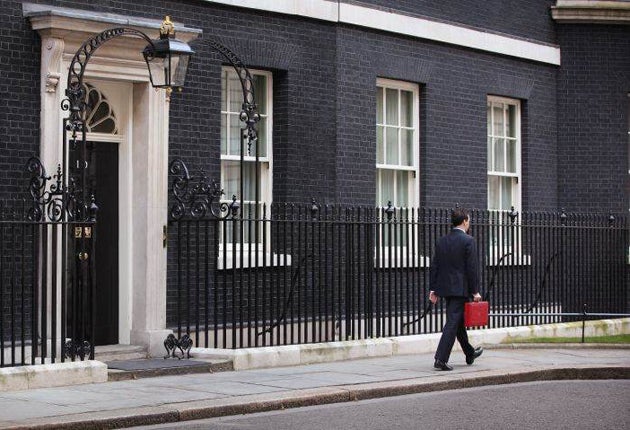Hamish McRae: Osborne bets on growth. Let's just hope he's lucky
Revenues have to go on rising for the numbers to add up

It is getting hairy. This only works if we get decent growth – solid thumping growth of close to 3 per cent a year by the back end of this parliament. If we get that, the national debt levels out and starts to come down as a percentage of GDP. If we don't – and the challenge will be to grow faster than the rest of the EU and well above our long-term trend – then it is not just the Coalition that is in trouble. We all are. So is this really a Budget for growth?
Well it is not a Budget against growth, and since the main business bodies have given it a general welcome, that's a start. But the debt mountain is as high as ever and if this Budget tells us anything, it is that we need things to come right in the next four years – or, in grander language, for a lot of the economic variables to turn out to be towards the more favourable end of the possible scale. So far, looking at our latest growth and inflation numbers, rather the reverse seems to be happening.
Stand back a moment and focus on the big numbers. The challenge, as before, is to get public spending down from 48 per cent of GDP to 40 per cent and get taxes and other revenue up from 36 per cent to 38 per cent – and we have four more years to do it. For all the rhetoric about cuts, not much has happened yet. This financial year, the one that ends next month, the budget deficit will be just on 10 per cent of GDP, whereas last financial year it was 11 per cent. We plan to get it down, in round numbers, to 8 per cent, 6 per cent, 4 per cent and then eventually to a little below 2 per cent.
You can have a debate as to whether we should correct the deficit more slowly but if we did we would end up paying more interest on the debt. We are already going to be paying £50bn of interest next year, which is more than we spend on defence and more than we raise in corporation tax.
Spending has come down as a proportion of GDP before, during the middle and latter 1980s and during much of the 1990s, so there are precedents here in Britain. Canada and Sweden also had to make similar-sized cuts in the 1990s. But this is huge and nothing that has happened in the past 10 months of this Government has made it any less so. The grind goes on.
On the tax side the Government is betting on revenues continuing to recover. They have come up a bit this year, as they always do in the early stages of a recovery. But they have to go on rising, particularly in the latter years of these forecasts, for the numbers to add up. There has to be more employment because without that the money simply does not come in.
Taxation in a democracy has to be by consent, and we have just seen the way political pressure has forced the Chancellor to cut fuel duty. He did not do it because he wanted to; he did so because there was no consent to increase it. And let us not kid ourselves that there are big untapped revenues out there to be harvested by an astute Chancellor. My quick tally of the likely revenue from the tax on executive jets is that it will bring in less than we spent in the past five days on firing missiles at Libya.
So will we get that 3 per cent a year growth that we need? Well, we may. The world economy is still in the early stages of a cyclical recovery and if this one follows anything like the pattern of previous ones we should get above-trend growth. It is an obvious point but if you have several years of below-trend growth, as we very much have, it is mathematically inevitable that you have some above-trend ones too. But as the Office for Budgetary Responsibility's forecasts bear out, there will be another lean year or two before the fat ones to come.
So does the Budget really lift the likely growth? Look, we should not dismiss it, for a number of reasons. It has been welcomed by most of the business community. The Government is presenting itself as pro-enterprise, as indeed did the last Labour government for the early part of its period in office. Presentation does matter. The action on skills must be welcome too. If the aims of the Coalition to simplify regulation, planning and taxation are carried through in detailed application then, sure, growth should be somewhat higher than it otherwise would have been.
But at best this takes time; at worst, the officers on the bridge give the orders but no one down in the engine room takes any notice. Come 10 years on and we may well look back on the early years of this Coalition as a success story: a government that did change the climate for enterprise and make the country a more competitive place.
But we are being naïve if we think this will change much in the next couple of years. We need the global recovery to continue and we need a bit of luck.

Join our commenting forum
Join thought-provoking conversations, follow other Independent readers and see their replies